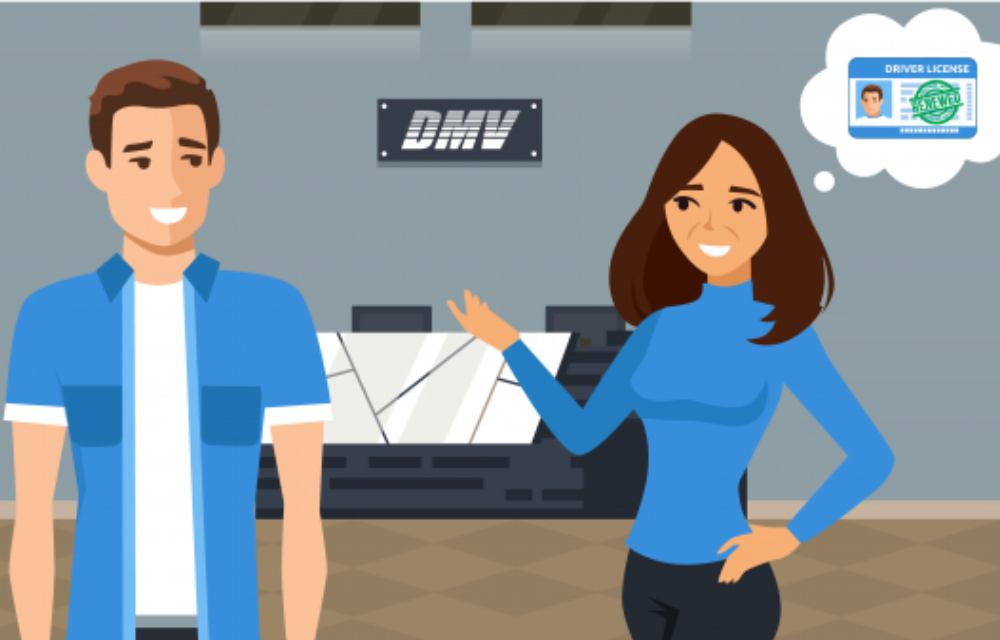
SR-22 Simplified: What, Why Needed, and How to Get It
TABLE OF CONTENTS
So you get busted for a DUI — or some other driving infraction — and the DMV suspends your license. Then they ask you for an SR-22 insurance document before you can drive again. Sound familiar? And now you’re wondering, what does that even mean? What’s an SR-22, where do I get one, and how much will it cost me?
You’re not alone.
You can be hit with an SR-22 requirement for several reasons, but a DUI conviction is a common one. And in the U.S., more than 750,000 people each year are arrested for driving under the influence.
Every one of those drivers who end up with an SR-22 requirement goes through a similar thought process — it’s confusing, and to make things worse, there’s a fair amount of misinformation out there about SR-22s and the insurance policies that go with them.
So let’s get to the business of answering these questions — accurately — and helping you get your license back, fast.
KEY TAKEAWAYS
- 1
An SR-22 is a proof-of-insurance document that must be filed by a state-recognized insurance carrier, not the policyholder.
- 2
SR-22s are required by the state in certain situations, such as after a DUI conviction or an uninsured accident, and cannot be avoided by selling a car, moving out of state, or stopping driving.
- 3
The insurance carrier that files the SR-22 must also notify the state if the policyholder's coverage lapses for any reason.
What is an SR-22?
Let’s start with the basics. An SR-22 is a proof-of-insurance document. You cannot file one yourself — a state-recognized insurance carrier has to file the SR-22 for you. In that filing, the carrier certifies that your auto coverage meets the state’s minimum requirements for car insurance.
Yikes, right? That means you’ll have to get auto insurance if don’t already have it. But stay with us here. There’s a lot more to learn about getting the right type of policy with the right insurer. The SR-22 filing also certifies that you’ll have that insurance going forward. This is where things get tricky. Because it means your insurance provider now has the job of letting the state know if you lose your coverage, for any reason at all.
Is it SR22, SR-22, SR 22 or SR22 Form?
If you’ve started researching already, you’ve probably seen references to the SR22, SR-22, SR-22, and SR22 Forms. All of these abbreviations refer to the same thing, the filing that tells the state you have insurance. The official name is “SR-22,” and — in case you were wondering — the SR stands for Safety Responsibility.
Is an SR-22 considered car insurance?
The SR-22 filing is not an insurance policy in itself — it’s simply proof that you have insurance.
Still, you’ll hear and see the term “SR-22 insurance.” That phrase simply refers to the insurance policy you carry while you’re fulfilling your SR-22 requirement. We’ll dive into the details of SR-22 insurance later in this document. For now, know that it works much like any other car insurance policy.
What is a certificate of financial responsibility?
Your state DMV may say something about a “certificate of financial responsibility.” This is another name for the SR-22 filing — not an additional hoop for you to jump through.
The name “certificate of financial responsibility” does sound ominous. But it only means that you have a minimum level of car insurance. By having that insurance, you should be ready to take ‘financial responsibility’ for any accidents you might cause.
Do I Need an SR-22?
You need an SR-22 when the DMV or court asks you to get one. And, there’s no getting around it either. You might be tempted to sell your car, move out of state, or even stop driving for a few years. Unfortunately, none of these strategies will work.
If you don’t own a car, you’ll need to get a non-owner policy. If you move out of state, your license will probably be suspended in your new home state. And if you stop driving for a few years, the SR-22 requirement will wait for you. You’ll eventually have to fulfill it to get your license reinstated.
SR-22 rules in your state
Each state sets its own rules about when an SR-22 is needed. For example, New Hampshire requires an SR-22 if you are convicted of DWI, leaving the scene of an accident, or a second reckless driving offense. You would also need an SR-22 if you’re at fault in an uninsured accident.
In the state of Washington, you may need an SR-22 for a DUI or reckless driving conviction — but also for failing to pay judgments or driving or owning a vehicle that’s been in an accident. And, some states don’t use SR-22s at all. If you’ve had a serious driving infraction recently and are worried about the SR-22, first take a look at the table below. You’re off the hook if your driving convictions happened in a state that doesn’t require SR-22s.
States that Don’t Require SR-22 Filings & Insurance | ||
States that Do Require SR-22 Filings & Insurance | Hawaii (Honolulu)*
| |
. | *Hawaii does not have a state-wide DMV. |
What’s the difference between the SR-22 and FR-44?
If you aren’t sure whether you need an SR-22, you should contact your state DMV and ask.
The SR-22 is closely related to another type of filing called the FR-44. FR-44s are required only in Florida and Virginia, usually following a DUI conviction. While the SR-22 certifies that your insurance meets the state’s minimum liability requirements, an FR-44 filing lets the state know that you have excess coverage.
According to the National Highway Traffic Safety Administration, roughly 33% of DUI convictions involve repeat offenders. And, the injuries related to drunk driving tend to be serious. In 2010, for example, damages and injuries from drunk driving accidents cost $44 billion. The thinking here is that you may end up driving under the influence again. And those higher FR-44 coverage requirements can help protect anyone who may be involved if there’s an accident.
SR-22 vs FR-22 Comparison
SR-22 | FR-44 | |
States | All states except Delaware, Kentucky, Minnesota, New Mexico, New York, North Carolina, Oklahoma, and Pennsylvania use the SR-22. | Only Florida and Virginia use the FR-44. |
Why You’d Need One | Various driving infractions can prompt the state to ask you for an SR-22, including driving without insurance and too many tickets in a short period of time. | A DUI conviction is the most common reason why you’d need an FR-44. |
Liability Coverage Requirements | Your policy must meet the state’s minimum liability coverage requirements. | Your policy must exceed the state’s minimum requirements*. |
*FR-44 coverage requirements in Florida are:
$100,000 in bodily injury/death of one person
$300,000 in bodily injury/death of multiple people
$50,000 in property damage
**FR-44 coverage requirements in Virginia are:
$50,000 in bodily injury/death of one person
$100,000 in bodily injury/death of multiple people
$40,000 in property damage
Where Do I Get an SR-22?
If you have car insurance already, you can get an SR-22 from your current insurance provider.
If you don’t have insurance, you’ll want to gather quotes and weigh your options. Know that not all carriers will file SR-22s for new customers. So if you’re calling around for quotes, make sure to tell them you need an SR-22 upfront.
What do I need to get an SR-22?
The specific requirements vary by state, but the good news is that your insurance company will handle the details for you. They’ll likely only need information they already have, like your driver’s license number and policy number.
How Does SR-22 Insurance Work?
As noted above, the underlying insurance policy that goes with your SR-22 filing is often called “SR-22 insurance.” This type of insurance mostly works like any other car insurance policy — you pay the premiums in exchange for a stated amount of coverage. There are two areas, though, where your SR-22 policy may differ from standard insurance. Those two areas are payment options and cost.
What are SR-22 insurance payment options
You may have limited payment options. Some carriers will ask you to pay for six or 12 months of coverage upfront, rather than allowing for monthly payments. There is a practical reason for this. Remember how we said that the insurer has to notify the DMV if your policy expires for any reason? Allowing for monthly payments creates more opportunities for missed payments and policy lapses.
What are SR-22 insurance costs
SR-22 insurance does cost more than standard auto insurance. This is because you only need an SR-22 when you’ve had blemishes on your driving record. Whatever the reason for the SR-22 requirement — maybe you had a DUI — that’s also the reason why your insurance rates will go up.
You can also think of it this way. The DMV only asks for an SR-22 when they’ve identified you as a higher-risk driver. The insurance carrier, too, knows that the SR-22 requirement is an indication of risk — and more risk always means higher rates.
To get a better sense of what this means for you and your rates, take a look at the table below. It shows the average rate increases for 18 different traffic violations.
Violation | Percent increase | Dollar increase |
DUI/DWI first offense | 79% | $1,131 |
Reckless driving | 73% | $1,046 |
Operating a vehicle in a race (highway racing) | 71% | $1,012 |
Speeding 30+ over the limit | 30% | $427 |
Careless driving | 26% | $372 |
Texting while driving | 23% | $344 |
Distracted driving | 22% | $320 |
Speeding ticket 16-29 MPH over the limit | 22% | $317 |
Improper/illegal pass | 20% | $293 |
Speeding ticket 1-15 MPH over the limit | 20% | $288 |
Following too closely | 20% | $284 |
Improper turn | 20% | $281 |
Failure to yield | 20% | $281 |
Failure to stop | 19% | $272 |
Talking on a cell phone while driving | 16% | $224 |
Driving without a license or permit | 12% | $178 |
Driving without insurance | 10% | $143 |
Seatbelt infraction | 3% | $47 |
On top of the cost of the insurance itself, some providers also charge a small fee (usually $25 or $50) to do the SR-22 filing.
How much does SR-22 insurance cost a month?
Of course, if you don’t have insurance today, the potential increase in rates shown above doesn’t mean much to you. So we have another table below that shows quoted rates by the carrier for a driver who has a DUI and needs an SR-22. The car insured in this case is a 2017 Honda Accord, and the policy includes full coverage with a $500 deductible on comprehensive and collision.
Company | Rate with SR-22 with DUI | Monthly Cost |
Geico | $2,982 | $248.50 |
Nationwide | $3,364 | $280.33 |
Farmers | $1,666 | $138.83 |
State Farm | $2,727 | $227.25 |
Allstate | $1,889 | $157.42 |
Progressive | $2,246 | $187.17 |
There are two important points to note about these numbers. First, your insurance carrier may ask you to pay for the policy upfront — so use those monthly costs for comparison purposes only.
And secondly, your rates may be quite different from what’s shown here. Car insurance rates vary drastically by driving record, where you live, how much you drive, level of coverage, and type of car.
Types of SR-22 Policies
Can I get an SR-22 if I don’t own a car?
One of the more confusing scenarios is when the DMV asks you for an SR-22 and you don’t even own a car. After all, insurance policies typically cover the cars you own. Can you even get insurance when you don’t own a car?
The answer is yes. You would need what’s called an Operator’s Certificate, which covers you with liability insurance when you’re driving someone else’s car.
Owner SR-22 vs. Operator SR-22
The Operator’s Certificate, or Operator SR-22, is one of three main types of SR-22 insurance. All three are defined for you below.
Type | Purpose |
Owner SR-22 Policy | Also called the “Owner’s Certificate,” this policy type covers car owners when they are driving a vehicle they own. |
Operator SR-22 | Known as “non-owner SR-22 insurance” or “Operator’s Certificate,” this policy type covers drivers when they’re driving someone else’s vehicle. |
Owner & Operator SR-22 | An Owner and Operator SR-22 policy covers drivers at all times, whether they’re driving their own car or someone else’s. |
How Long Does it Take to Get SR-22 Insurance?
You might be wondering, “Can I get an SR-22 today?” Often, the answer is yes. Many insurance carriers can file your SR-22 electronically within 24-72 hours. Usually, the biggest hurdle you’ll face is paying for the insurance policy.
Can I buy a policy with an SR-22 online?
Yes, you can get an SR-22 insurance policy online. See our table here for insurers that offer online SR-22 quotes.
What Does SR-22 Insurance Cover?
Your SR-22 policy has to meet the state’s coverage requirements. Each state defines its own minimum coverage rules, but all states require some form of liability coverage. Some states also ask you to carry uninsured motorist protection and/or personal injury protection. We explain these different coverages in the table below.
Coverage Type | Description |
Bodily Injury Liability | If you are driving and cause an accident that injures someone, your bodily injury (or BI) insurance helps pay that person’s medical expenses. Your coverage will be capped per person and also per accident. If you are quoted on 50/100 bodily injury coverage, this means you have $50,000 of insurance per person and $100,000 of insurance per accident. |
Property Damage Liability | Property damage pays to fix someone else’s property in an accident you caused. Usually, that property is the other driver’s car. Your stated property damage limit is per accident. Insurance requirements may be presented as three numbers separated by slashes, as in 50/100/25. The first two numbers are bodily injury requirements, person and per accident. The last number is the property damage requirement. |
Personal Injury Protection | Some states require personal injury protection (PIP), which covers your medical expenses and rehabilitation expenses if you are injured in an accident. Usually, you can use your PIP insurance benefits no matter who caused the accident. |
Underinsured/Uninsured Motorist Protection | If you are in an accident that’s caused by an underinsured driver, you’ll normally get stuck paying your own medical and vehicle repair bills. Underinsured/uninsured motorist protection addresses that situation — covering your costs if the at-fault driver doesn’t have enough insurance. |
Can I get full coverage SR-22 insurance?
Yes, you can! While there are minimum requirements for your SR-22 policy, there are no maximums. You can optionally add any type of coverage that your provider offers. For example, you may want to carry uninsured motorist protection even if your state doesn’t require it. And you may like the idea of collision insurance, which pays for repairing your own car if you have an accident.
Who Offers SR-22 Insurance?
Below is a list of national insurers that offer SR-22 filings and policies. All of the claims satisfaction scores referenced below come from the J.D. Power 2018 U.S. Auto Claims Satisfaction Study unless noted otherwise.
Company | Overview |
Allstate ranks 11th out of 23 top insurance providers in claims satisfaction. The advantages of using Allstate include access to a designated agent, a claims satisfaction guarantee, and an easy mobile claims process. To request an SR-22 from Allstate, start by contacting a local agent. | |
Dairyland promotes its easy SR-22 and FR-44 filing process and its low-cost liability insurance. They also offer non-owner insurance. The company has a 4-star rating (out of 5), made up of 2,782 reviews on TrustPilot.com. Your Dairyland agent can help you get that SR-22 filed. | |
Esurance ranks 17th out of 23 in claims satisfaction and earned high marks in call center service In the 2018 J.D. Power Insurance Shopping Study. Although you might expect Esurance to have an online form for an SR-22, you do have to call to request one. | |
Farmers ranks 4th among 23 in claims satisfaction — this is the highest rank of any of our SR-22 insurers. They have an online SR-22 quote form available here. After you complete the form, an agent will contact you with rates. | |
Geico’s claims satisfaction scores are the same as Allstate’s, ranking 12th out of 23. Geico is a good fit if you want a lot of coverage options and if you prefer using a mobile app to manage your insurance. Geico’s mobile app currently has a 5-star rating with 1.2 million reviews in the iTunes App Store. You can request an SR-22 from Geico online. Simply fill out the quote request form. After you get the quote and go through the steps to buy the policy, you’ll check the box that asks if you need a Certificate of Financial Responsibility or SR-22. | |
Nationwide performs just a hair better than Allstate and Geico in claims satisfaction. But the company is best known for its interesting coverage options like gap insurance and deductible credits for every year you drive without an accident. Nationwide operates through its network of agents. If you don’t already have Nationwide insurance, start by finding an agent. That agent can help you with your SR-22 filing. | |
Progressive ranks 17th in claims satisfaction, just below Esurance. Notably, Reviews.com selected Progressive as the best overall insurer for high-risk drivers. An interesting perk for Progressive customers is Pet Injury Protection, which covers vet bills if your pet is injured in an accident. Pet Injury Protection is included with Progressive’s collision coverage. Existing customers need to call Progressive to request an SR-22. If you don’t already have Progressive, fill out the online quote form first. | |
Safeco ranks 18th in claims satisfaction, which is the lowest of the ranked providers in the J.D. Powers survey. (Dairyland and The General are unranked.) Safeco may be a good fit if you plan on driving very safely — this insurer rewards safe driving over time with accident forgiveness and deductible credits. You’ll call Safeco to request your SR-22 or, if you aren’t yet a Safeco customer, to start your auto insurance quote. | |
The General specializes in low-cost coverage for high-risk drivers. Note that customer reviews indicate that The General’s low rates may be misleading, thanks to extra fees and the company’s restrictive cancellation practices. To get an SR-22 from the General, fill out the online quote form and indicate that you need an SR-22. Or, if you already have insurance from The General, give customer service a call. |
SR-22 FAQ
How long do I need to have SR-22 insurance?
Each state sets its own timeline for the SR-22. The minimum requirement is usually three years. But it could be longer or shorter than that, depending on the state’s rules and your driving record.
More serious driving convictions — DUIs or multiple reckless driving offenses — can lead to longer SR-22 requirements.
How long is the SR-22 valid?
When an insurer files an SR-22 for you, that insurer has to let the state know when your insurance lapses. So your SR-22 filing is valid for as long as you keep your insurance policy in force until you’ve fulfilled the requirement.
What if my policy cancels?
If your policy cancels or your coverage lapses for any reason, the insurer files an SR-26 — this is a document that tells the state you don’t have auto insurance. You’d then be in violation of your SR-22 requirement. That usually means your license will be suspended.
You’ll also reset the SR-22 clock. Say you originally had a three-year SR requirement, and you carried the insurance for two years before letting it lapse. Basically, you get no credit for those two years. When you do pick up insurance again, you’ll have to keep it active for three years running to fulfill your requirement.
That’s why it’s critical you stay on top of your premiums and avoid any lapses in coverage.
What if I need an SR-22 in another state?
Say you head out on a road trip from your hometown of Phoenix to New Orleans, with Jazz Fest tickets in hand. And in your excitement, you get stopped in Texas for reckless driving. If Texas asks you for an SR-22, you’ll have to get one — even if you never set foot in Texas again. Skipping out on this requirement will only cause you problems at home. The Texas DMV will share the state of your SR-22 with your home state’s DMV.
In this case, talk to your auto insurer about an out-of-state filing. If your insurance provider operates in the state requiring the SR-22, they can usually file it for you.
If you don’t have insurance, contact national carriers and explain your situation. Insurers that operate in both states should be able to help.
You might run into trouble if you live in a state that doesn’t use the SR-22 but you’re required to have one elsewhere. In this case, contact the state DMV that’s asking for the SR-22 — you will have to negotiate a different type of proof of insurance.
What if I move?
Even if you move to another state, you’ll have to keep your SR-22 filed in the state that originally required it. If your insurer is licensed in both states, talk to your agent about transferring your policy to the new state. If the insurer is not licensed in the new state, you’ll need a new insurer that can file an out-of-state SR-22 for you in the old state.
Just don’t let your coverage lapse in the transition! If you do, your new home state will be notified that you didn’t fulfill your SR-22 requirement. Your license will then get suspended at home.
Concluding takeaways:
If any DMV has asked you for an SR-22, you have to show proof of insurance to keep your driver’s license valid.
Many carriers offer SR-22 filings and insurance policies, and some have SR-22 quote forms online.
The cost of SR-22 insurance can vary widely among carriers. Gather up your quotes to find the best rates and the best fit.
Pay for your insurance policy upfront and keep renewing it until your SR-22 requirement is fulfilled.
TABLE OF CONTENTS


Trying to find the best insurance?
We'll help you find the policy that offers the best value for your situation.
Further Reading

Navigating the Digital Insurance Landscape Considerations
A look at the immense value and high customer lifetime potential within the insurance sector.
Read article

When is Term Life Insurance Worth it?
Decide if term life's advantages are worth it: compare whole vs term life insurance, assess top term providers, and delve into in-depth reviews.
Read article

Insurance Binder: Bridging Between Coverage and Confirmation
From car loans to rental properties, insurance binders are required in a variety of situations. Discover the ins and outs of these essential documents.
Read article

Haven Life Review: Providing Prudent and Protective Policies
Uncover the benefits and drawbacks of Haven Life's term insurance policies, along with eligibility details, pricing, and customer feedback..
Read article
Start Comparing Quotes
Search from our learning center to learn everything from how to easily switch your car insurance to the ins and outs of home insurance.
Fill out just one form and get multiple quotes!




